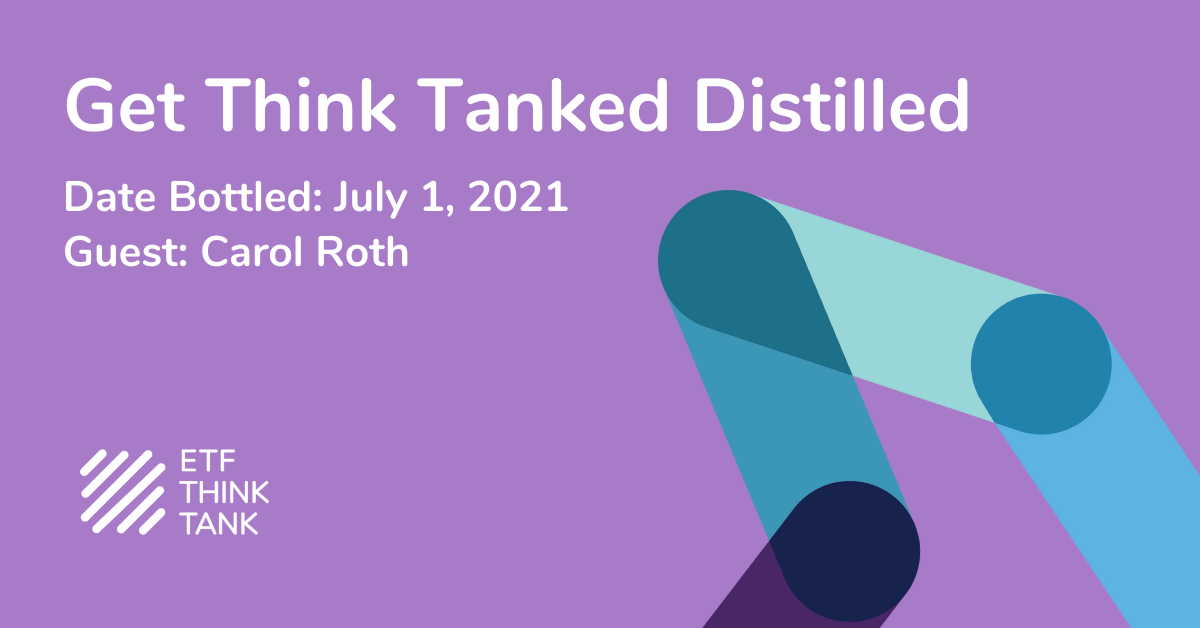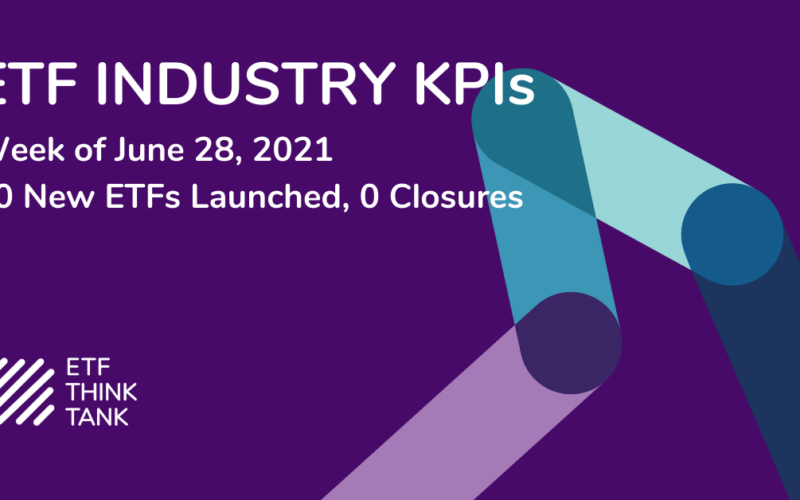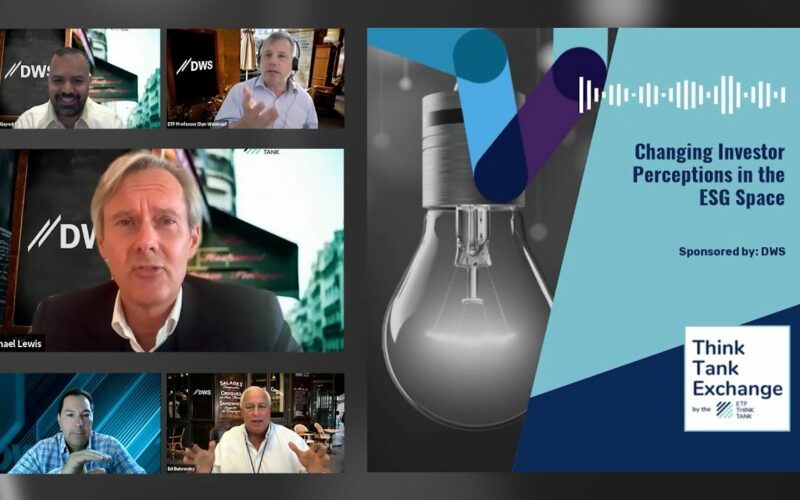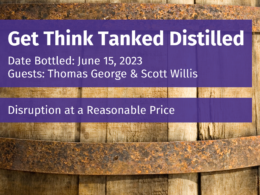The COVID-19 recession hit almost every corner of the U.S. economy, but it was especially tough on small businesses. While many larger corporations were not only able to survive, but actually thrive, small businesses were forced to shutter in huge numbers as wealth inequality grew both for consumers and businesses.
The ETF Think Tank welcomed Carol Roth, author of “The War on Small Business” and long-time advocate for small businesses and small government, to discuss the landscape for small businesses in a post-COVID world.
Roth was quick to note that she felt not a lot went right in the government’s response to the pandemic. The government intended PPP loans to act as a lifeline to small businesses to keep them afloat, but, in reality, many loans got caught up in bureaucratic red tape or failed to make it to the businesses that needed it most. If small businesses got a few crumbs and survived another day, did that go right? Most of the bread ended up going to large companies. Fed balance sheet expansion helped big tech companies gain $3+ trillion in market cap, while 400,000 small businesses shuttered.
What should have happened instead? Roth notes that the easy answer is monetary benefits could have been more targeted. There were government mandates that deemed many small businesses non-essential and forced them to close. That is a version of eminent domain and small businesses should have been compensated for being forced to shut down. An appropriation of $1.5 trillion could have bought 2-3 months for these businesses in order to develop some type of contingency plan. Workers could have been paid to stay home and it could have preserved the businesses. It would have provided a sense that workers were still employed and could have gone a long way towards risk mitigation. The government could have essentially just suspended things for 2-3 months until everyone got a better handle on the COVID pandemic.
Perhaps the biggest issue was that the COVID pandemic helped to facilitate the biggest transfer of wealth from Main Street to Wall Street. Roth says that if small businesses were not allowed to open, those revenues ended up going to big companies. The disparity in the ability for small and large businesses to gain access to credit grew wider during the pandemic. Funding is the lifeblood of companies that happen to qualify for credit, but the cost of obtaining that financing is incredible, especially during a pandemic when most banks significantly tightened their lending standards. On the flip side, large companies continued to borrow at record low interest rates and kept right on growing.
Roth went on to talk about her dislike for the so-called “zombie” companies, generally defined as those that do not make enough profit to service the interest on their debts, let alone pay back the debt. These are the companies that ended up receiving a disproportionate amount of PPP. These are the companies that were wounded even before the pandemic. Forgiving PPP loans to companies that were dead already just makes the situation worse.
Is Roth optimistic that the environment for small businesses can change? There are certain areas where small businesses can succeed. Restaurants, for example, are really hard because they’re the easiest to get into, but it results in the most failures. Those businesses that focus on scalable industries instead of a passion project tend to do better. Many want to start a business where they can do what they want or enjoy, but they do not really want to operate a business. You need the right person pursuing the right opportunity at the right time. If one of those isn’t in line with the other, it’s likely to fail.
Successful entrepreneurs tend to be those who are able to execute on their plans. The same idea can yield wildly different results and it’s the execution that makes the difference. Roth uses the UFC as an example, the mixed martial arts promotion that was near bankruptcy early on but turned into a global powerhouse once new leadership took over. Many entrepreneurs approach a new business like a wedding – a lot of focus on the wedding day and not the happily ever after. What is not healthy is when small businesses are deemed non-essential and aren’t being given the same opportunities.
This week our guest will be Peter Atwater, joining us to discuss confidence-driven decision making and the K shaped recovery. Sign up here.
Disclosure
The information provided here is for financial professionals only and should not be considered an individualized recommendation or personalized investment advice. The investment strategies mentioned here may not be suitable for everyone. Each investor needs to review an investment strategy for his or her own particular situation before making any investment decision.
All expressions of opinion are subject to change without notice in reaction to shifting market conditions. Data contained herein from third party providers is obtained from what are considered reliable sources. However, its accuracy, completeness or reliability cannot be guaranteed.
Examples provided are for illustrative purposes only and not intended to be reflective of results you can expect to achieve.
All investments involve risk, including possible loss of principal.
The value of investments and the income from them can go down as well as up and investors may not get back the amounts originally invested, and can be affected by changes in interest rates, in exchange rates, general market conditions, political, social and economic developments and other variable factors. Investment involves risks including but not limited to, possible delays in payments and loss of income or capital. Neither Toroso nor any of its affiliates guarantees any rate of return or the return of capital invested. This commentary material is available for informational purposes only and nothing herein constitutes an offer to sell or a solicitation of an offer to buy any security and nothing herein should be construed as such. All investment strategies and investments involve risk of loss, including the possible loss of all amounts invested, and nothing herein should be construed as a guarantee of any specific outcome or profit. While we have gathered the information presented herein from sources that we believe to be reliable, we cannot guarantee the accuracy or completeness of the information presented and the information presented should not be relied upon as such. Any opinions expressed herein are our opinions and are current only as of the date of distribution, and are subject to change without notice. We disclaim any obligation to provide revised opinions in the event of changed circumstances.
The information in this material is confidential and proprietary and may not be used other than by the intended user. Neither Toroso or its affiliates or any of their officers or employees of Toroso accepts any liability whatsoever for any loss arising from any use of this material or its contents. This material may not be reproduced, distributed or published without prior written permission from Toroso. Distribution of this material may be restricted in certain jurisdictions. Any persons coming into possession of this material should seek advice for details of and observe such restrictions (if any).











